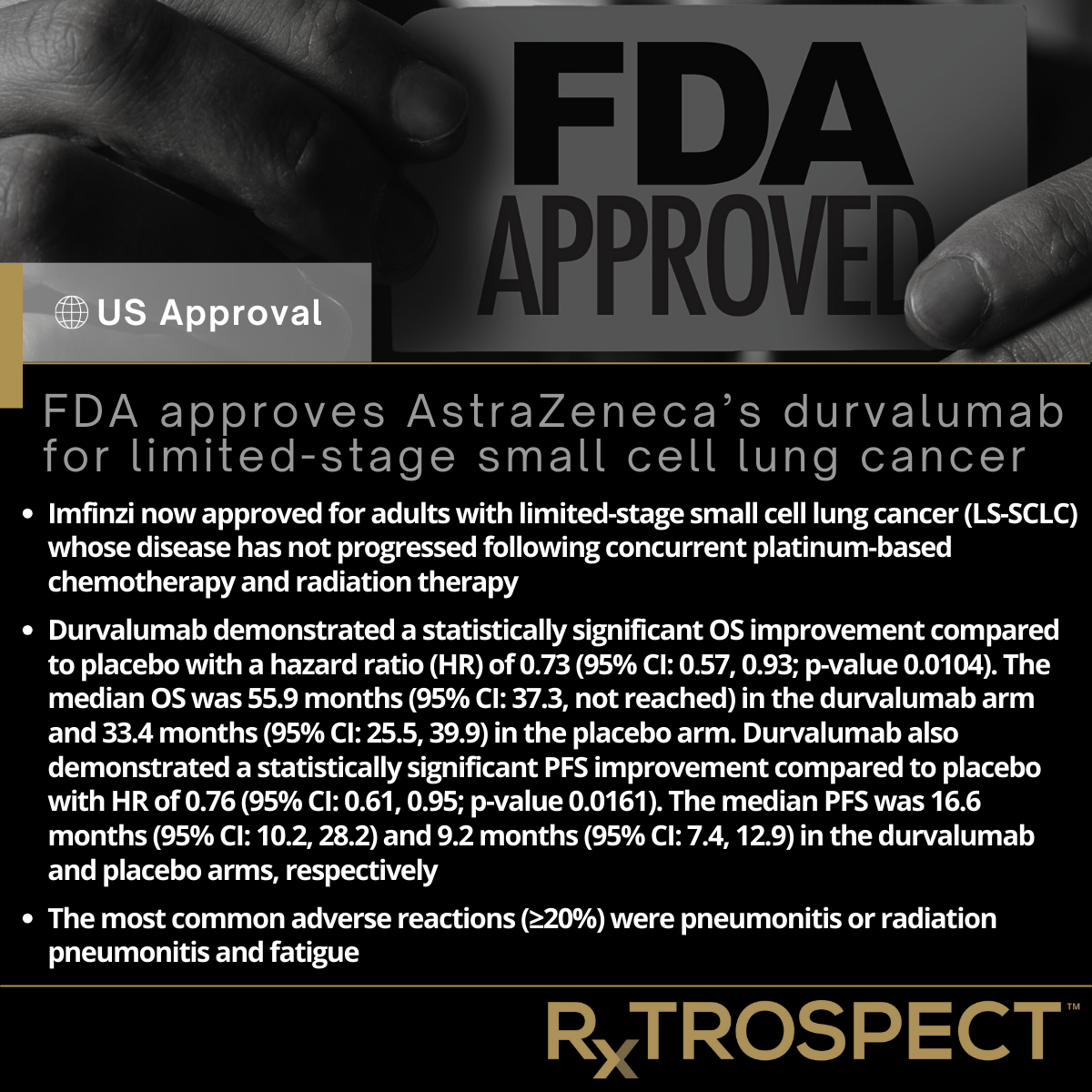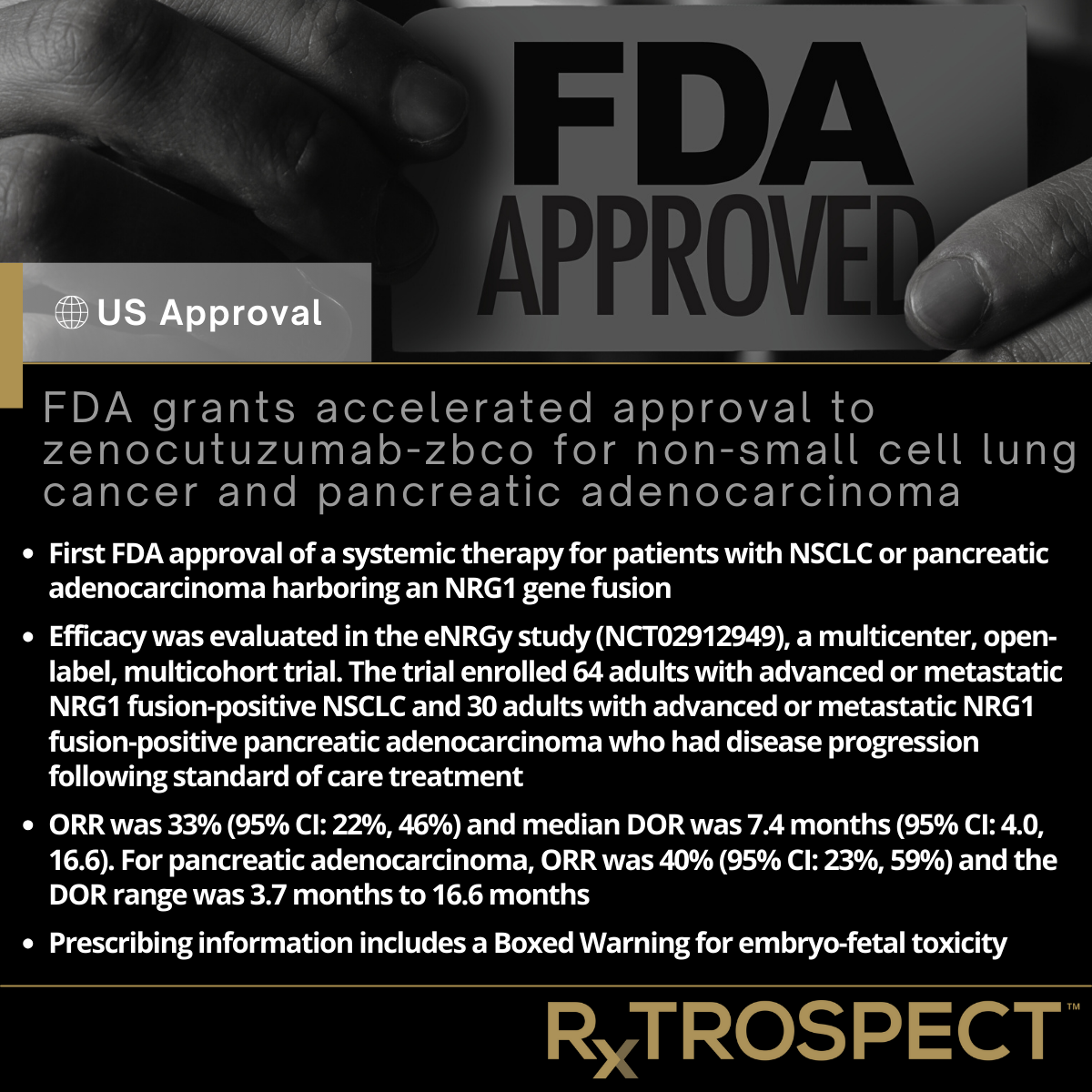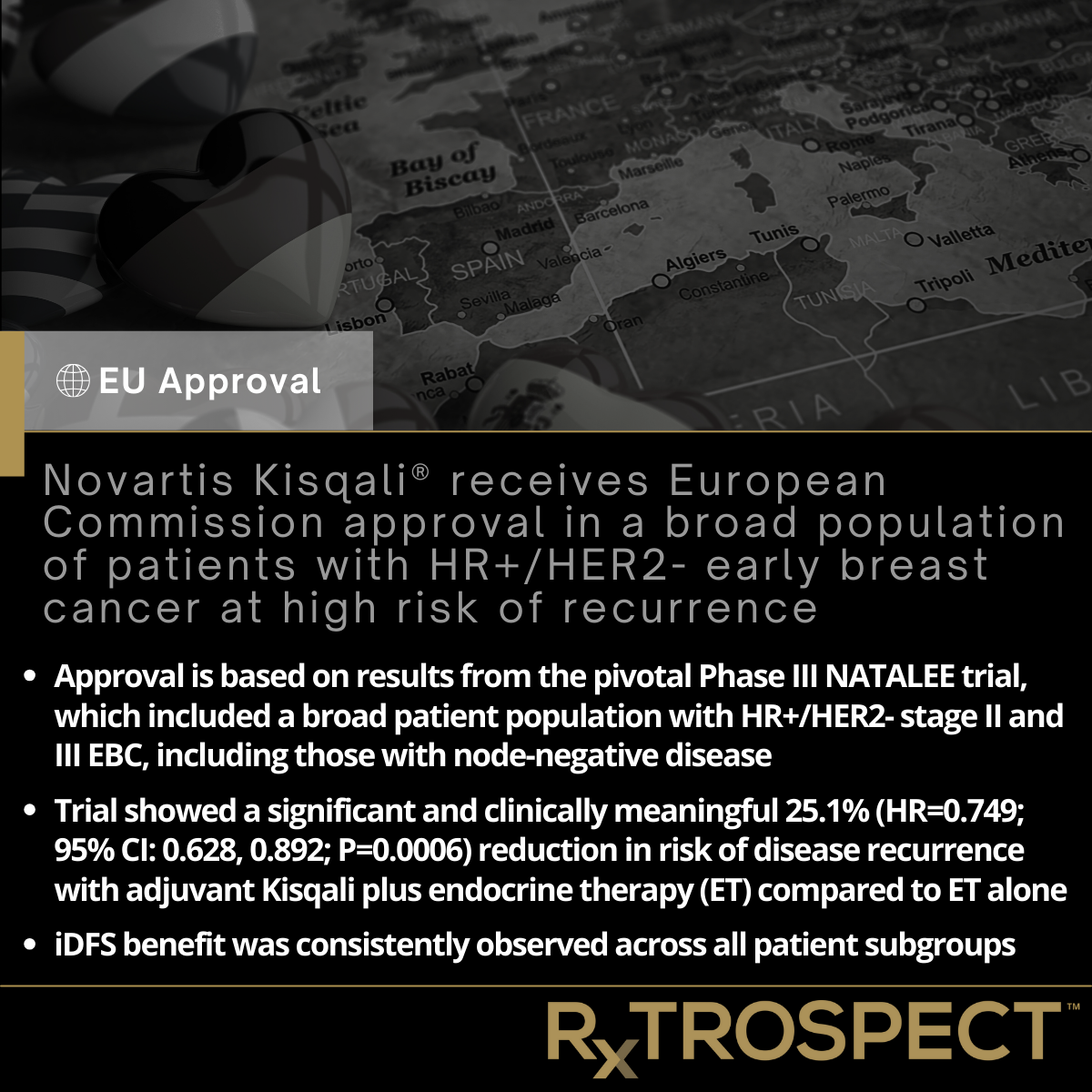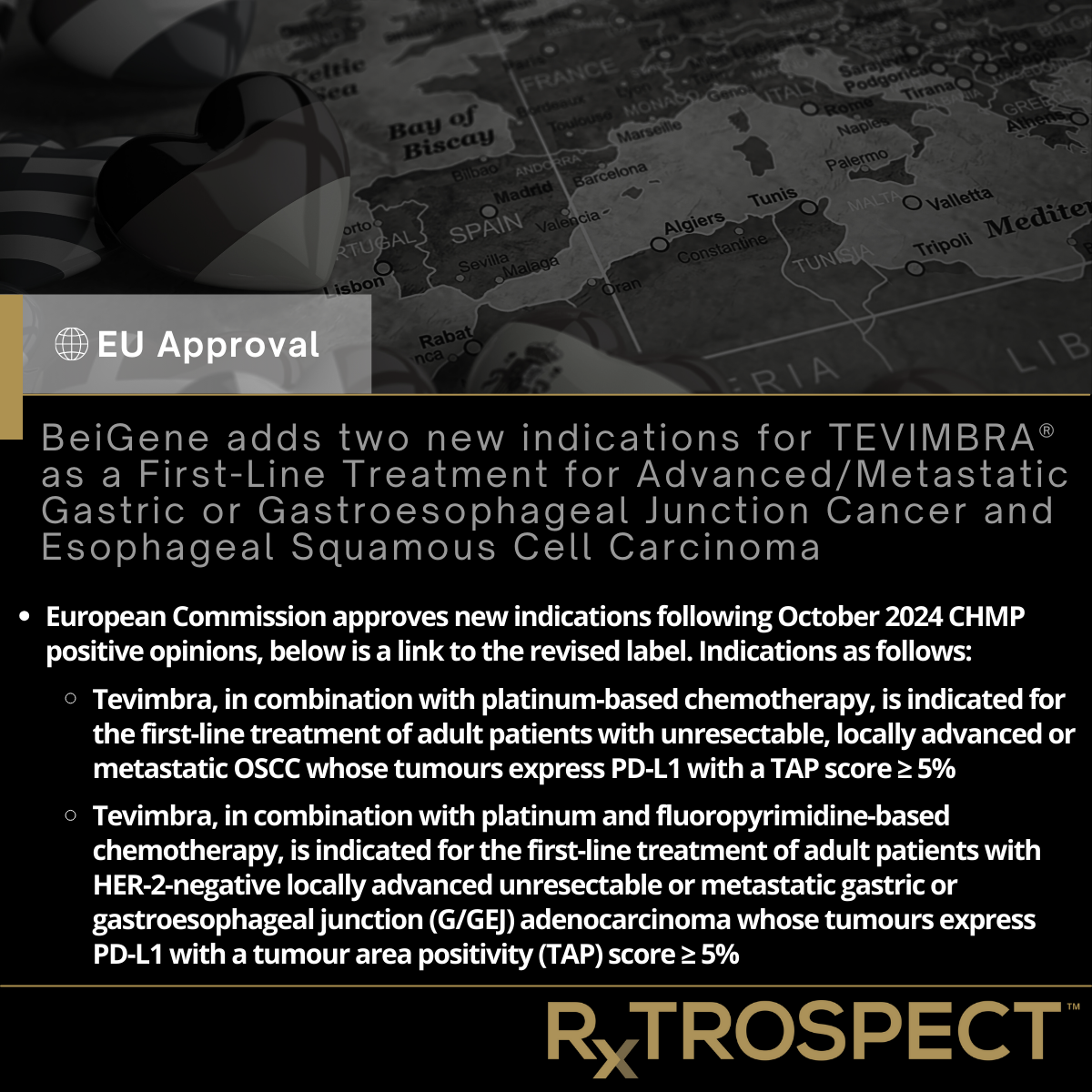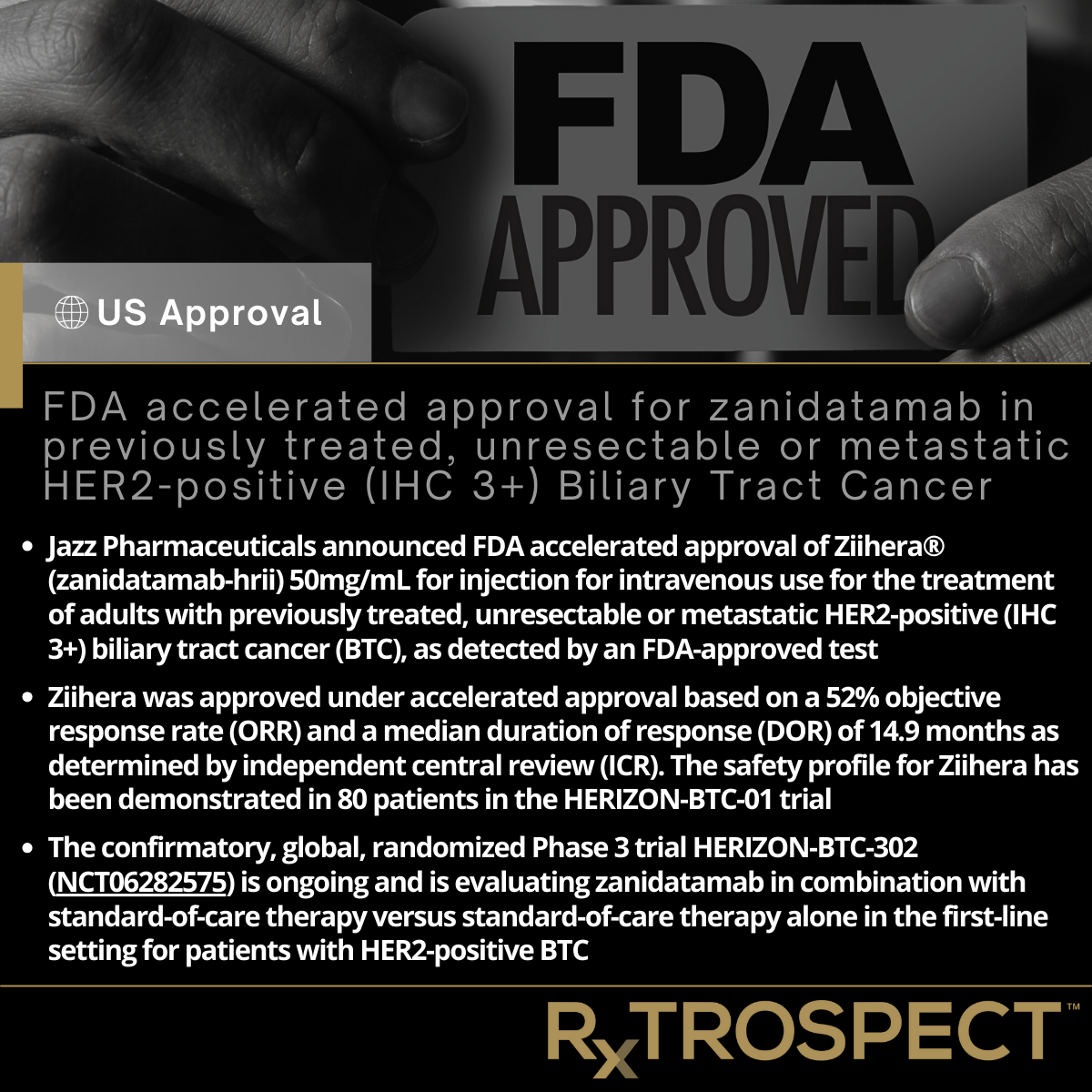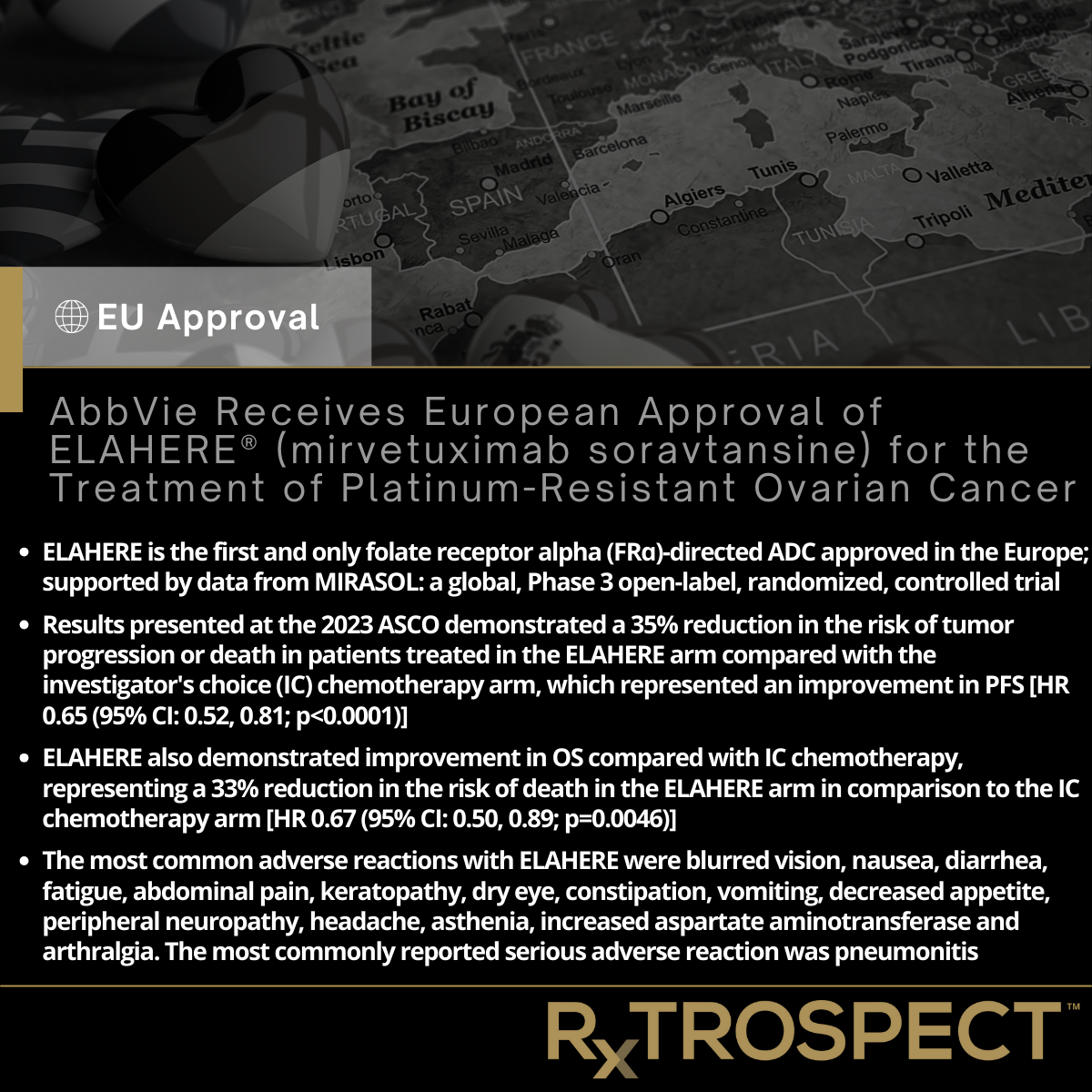Newsroom
FDA approves ensartinib for ALK-positive locally advanced or metastatic non-small cell lung cancer
FDA approves ensartinib for ALK-positive locally advanced or metastatic non-small cell lung cancer
Ensartinib demonstrated a statistically significant PFS improvement compared to crizotinib with a hazard ratio (HR) of 0.56 (95% CI: 0.40, 0.79; p-value 0.0007)
The median PFS was 25.8 months (95% CI: 21.8, not estimable) in the ensartinib arm and 12.7 months (95% CI: 9.2, 16.6) in the crizotinib arm
There was no statistically significant difference in OS (HR 0.88 [95% CI: 0.63, 1.23], p-value 0.4570)
The most common adverse reactions (≥20%) were rash, musculoskeletal pain, constipation, cough, pruritis, nausea, edema, pyrexia, and fatigue
FDA approves Unloxcyt, a new PD-L1 from Checkpoint Therapeutics, Inc.
FDA approves Unloxcyt, a new PD-L1 from Checkpoint Therapeutics, Inc.
Efficacy was evaluated in Study CK-301-101 (NCT03212404), a multicenter, multicohort, open-label trial in 109 patients with mCSCC or laCSCC
ORR was 47% (95% CI: 36, 59) for patients with mCSCC (n=78) and 48% (95% CI: 30, 67) for patients with laCSCC (n=31). Median DOR was not reached (range: 1.4+, 34.1+) in patients with mCSCC and 17.7 months (range: 3.7+, 17.7) in patients with laCSCC.
The most common adverse reactions (≥10%) were fatigue, musculoskeletal pain, rash, diarrhea, hypothyroidism, constipation, nausea, headache, pruritis, edema, localized infection, and urinary tract infection
FDA approves AstraZeneca’s durvalumab for limited-stage small cell lung cancer
FDA approves AstraZeneca’s durvalumab for limited-stage small cell lung cancer
Imfinzi now approved for adults with limited-stage small cell lung cancer (LS-SCLC) whose disease has not progressed following concurrent platinum-based chemotherapy and radiation therapy
Durvalumab demonstrated a statistically significant OS improvement compared to placebo with a hazard ratio (HR) of 0.73 (95% CI: 0.57, 0.93; p-value 0.0104). The median OS was 55.9 months (95% CI: 37.3, not reached) in the durvalumab arm and 33.4 months (95% CI: 25.5, 39.9) in the placebo arm. Durvalumab also demonstrated a statistically significant PFS improvement compared to placebo with HR of 0.76 (95% CI: 0.61, 0.95; p-value 0.0161). The median PFS was 16.6 months (95% CI: 10.2, 28.2) and 9.2 months (95% CI: 7.4, 12.9) in the durvalumab and placebo arms, respectively
The most common adverse reactions (≥20%) were pneumonitis or radiation pneumonitis and fatigue
FDA grants accelerated approval to zenocutuzumab-zbco for non-small cell lung cancer and pancreatic adenocarcinoma
FDA grants accelerated approval to zenocutuzumab-zbco for non-small cell lung cancer and pancreatic adenocarcinoma
First FDA approval of a systemic therapy for patients with NSCLC or pancreatic adenocarcinoma harboring an NRG1 gene fusion.
Efficacy was evaluated in the eNRGy study (NCT02912949), a multicenter, open-label, multicohort trial. The trial enrolled 64 adults with advanced or metastatic NRG1 fusion-positive NSCLC and 30 adults with advanced or metastatic NRG1 fusion-positive pancreatic adenocarcinoma who had disease progression following standard of care treatment.
ORR was 33% (95% CI: 22%, 46%) and median DOR was 7.4 months (95% CI: 4.0, 16.6). For pancreatic adenocarcinoma, ORR was 40% (95% CI: 23%, 59%) and the DOR range was 3.7 months to 16.6 months.
Prescribing information includes a Boxed Warning for embryo-fetal toxicity
Novartis Kisqali® receives European Commission approval in a broad population of patients with HR+/HER2- early breast cancer at high risk of recurrence
Novartis Kisqali® receives European Commission approval in a broad population of patients with HR+/HER2- early breast cancer at high risk of recurrence
Approval is based on results from the pivotal Phase III NATALEE trial, which included a broad patient population with HR+/HER2- stage II and III EBC, including those with node-negative disease.
Trial showed a significant and clinically meaningful 25.1% (HR=0.749; 95% CI: 0.628, 0.892; P=0.0006) reduction in risk of disease recurrence with adjuvant Kisqali plus endocrine therapy (ET) compared to ET alone.
iDFS benefit was consistently observed across all patient subgroups.
BeiGene adds two new indications for TEVIMBRA® as a First-Line Treatment for Advanced/Metastatic Gastric or Gastroesophageal Junction Cancer and Esophageal Squamous Cell Carcinoma
BeiGene adds two new indications for TEVIMBRA® as a First-Line Treatment for Advanced/Metastatic Gastric or Gastroesophageal Junction Cancer and Esophageal Squamous Cell Carcinoma
European Commission approves new indications following October 2024 CHMP positive opinions, below is a link to the revised label. Indications as follows:
Tevimbra, in combination with platinum-based chemotherapy, is indicated for the first-line treatment of adult patients with unresectable, locally advanced or metastatic OSCC whose tumours express PD-L1 with a TAP score ≥ 5%
Tevimbra, in combination with platinum and fluoropyrimidine-based chemotherapy, is indicated for the first-line treatment of adult patients with HER-2-negative locally advanced unresectable or metastatic gastric or gastroesophageal junction (G/GEJ) adenocarcinoma whose tumours express PD-L1 with a tumour area positivity (TAP) score ≥ 5%
FDA accelerated approval for zanidatamab in previously treated, unresectable or metastatic HER2-positive (IHC 3+) Biliary Tract Cancer
FDA accelerated approval for zanidatamab in previously treated, unresectable or metastatic HER2-positive (IHC 3+) Biliary Tract Cancer
Jazz Pharmaceuticals announced FDA accelerated approval of Ziihera® (zanidatamab-hrii) 50mg/mL for injection for intravenous use for the treatment of adults with previously treated, unresectable or metastatic HER2-positive (IHC 3+) biliary tract cancer (BTC), as detected by an FDA-approved test.
Ziihera was approved under accelerated approval based on a 52% objective response rate (ORR) and a median duration of response (DOR) of 14.9 months as determined by independent central review (ICR). The safety profile for Ziihera has been demonstrated in 80 patients in the HERIZON-BTC-01 trial.
The confirmatory, global, randomized Phase 3 trial HERIZON-BTC-302 (NCT06282575) is ongoing and is evaluating zanidatamab in combination with standard-of-care therapy versus standard-of-care therapy alone in the first-line setting for patients with HER2-positive BTC.
AbbVie Receives European Approval of ELAHERE® (mirvetuximab soravtansine) for the Treatment of Platinum-Resistant Ovarian Cancer
AbbVie Receives European Approval of ELAHERE® (mirvetuximab soravtansine) for the Treatment of Platinum-Resistant Ovarian Cancer
ELAHERE is the first and only folate receptor alpha (FRɑ)-directed ADC approved in the Europe; supported by data from MIRASOL: a global, Phase 3 open-label, randomized, controlled trial.
Results presented at the 2023 ASCO demonstrated a 35% reduction in the risk of tumor progression or death in patients treated in the ELAHERE arm compared with the investigator's choice (IC) chemotherapy arm, which represented an improvement in PFS [HR 0.65 (95% CI: 0.52, 0.81; p<0.0001)].
ELAHERE also demonstrated improvement in OS compared with IC chemotherapy, representing a 33% reduction in the risk of death in the ELAHERE arm in comparison to the IC chemotherapy arm [HR 0.67 (95% CI: 0.50, 0.89; p=0.0046)].
The most common adverse reactions with ELAHERE were blurred vision, nausea, diarrhea, fatigue, abdominal pain, keratopathy, dry eye, constipation, vomiting, decreased appetite, peripheral neuropathy, headache, asthenia, increased aspartate aminotransferase and arthralgia. The most commonly reported serious adverse reaction was pneumonitis.





